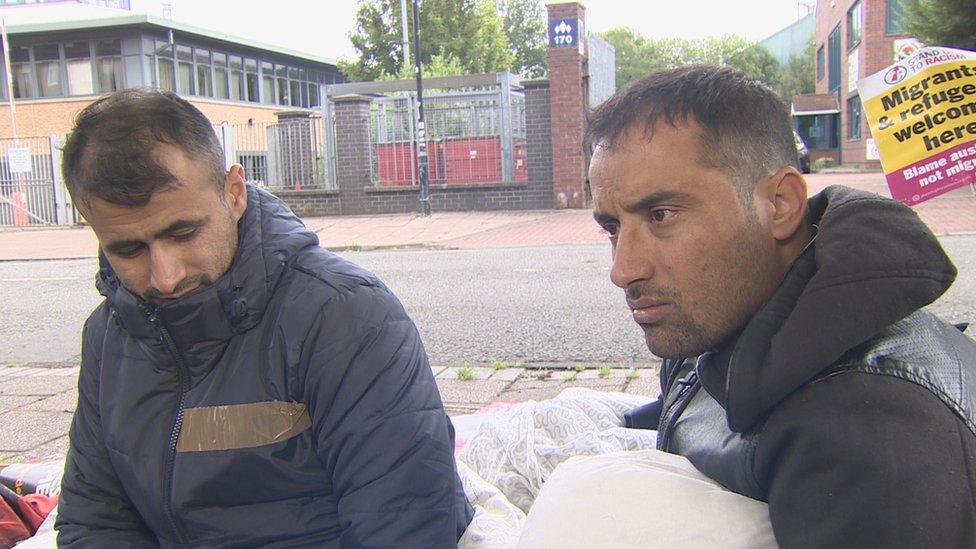Serco 'welcomes' legal challenges to asylum evictions plan
- Published
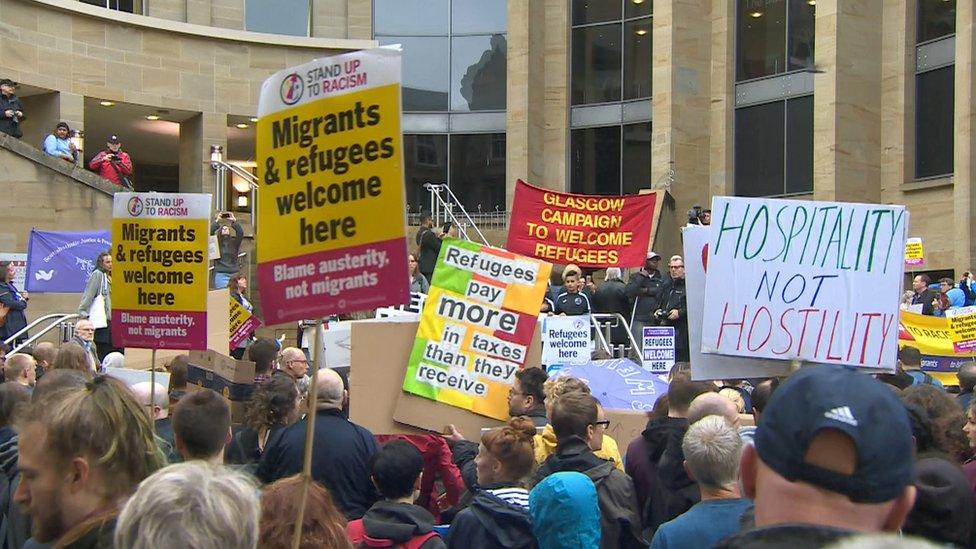
The planned action by Serco has prompted days of protests in Glasgow
The boss of public service provider Serco has welcomed legal moves bidding to stop asylum seeker evictions from properties run by his firm.
Rupert Soames said the court challenges could "bring clarity to an area of law that some people feel is unclear".
Housing charity Shelter Scotland has filed papers at Glasgow Sheriff Court to prevent two tenants being issued with so-called lock-change orders.
Serco says it is providing housing for 330 people "at its own expense".
As well as the sheriff court action, the issue is also due to be raised in the Court of Session in Edinburgh after a case was lodged by Govan Law Centre, which is also trying to prevent the evictions by Serco.
Serco is contracted to provide housing while applications are considered by the Home Office.
Earlier this month it said it planned to evict those tenants who had exhausted the asylum process.
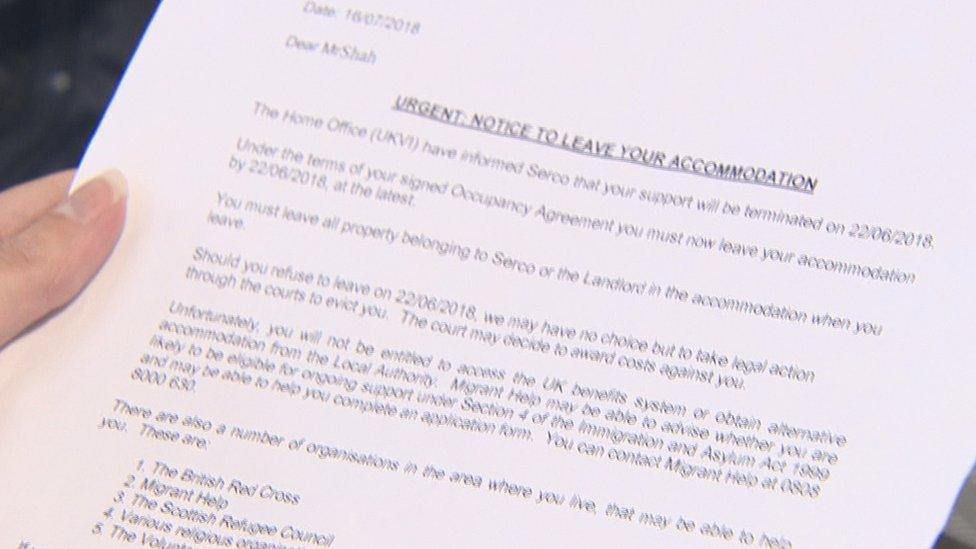
Asylum seekers have received letters from Serco saying they must leave their accommodation
The company said it was no longer willing to provide free accommodation to "over-stayers" and would serve lock-change notices to no more than 10 people a week.
Its position prompted widespread criticism from politicians and campaigners who have accused it of putting profit before people.
Following a weekend of protests outside the Home Office building in Brand Street in Glasgow, Serco said it would halt the action "whilst the law is being tested and clarified".
'Temporary victory'
Shelter Scotland's legal team presented papers at Glasgow Sheriff Court on Monday on behalf of two of the six asylum seekers who have been issued with eviction notices, while a third was represented by the Legal Services Agency.
Shelter's principal solicitor Fiona McPhail said the halt in the action was a "massive temporary victory", and said she would put forward "various arguments" against the evictions.
She said: "There's different arguments, one of the ones we're keen to put forward is the human rights perspective.
"These individuals are at risk of losing their home, we're arguing that Serco are acting on instructions from the Home Office and acting as a public authority and therefore have obligations under the Human Rights Act.
"That there's a requirement for there to be due process, there needs to be safeguards in place and it's not compliant for there to merely be a lock-change at a certain stage."
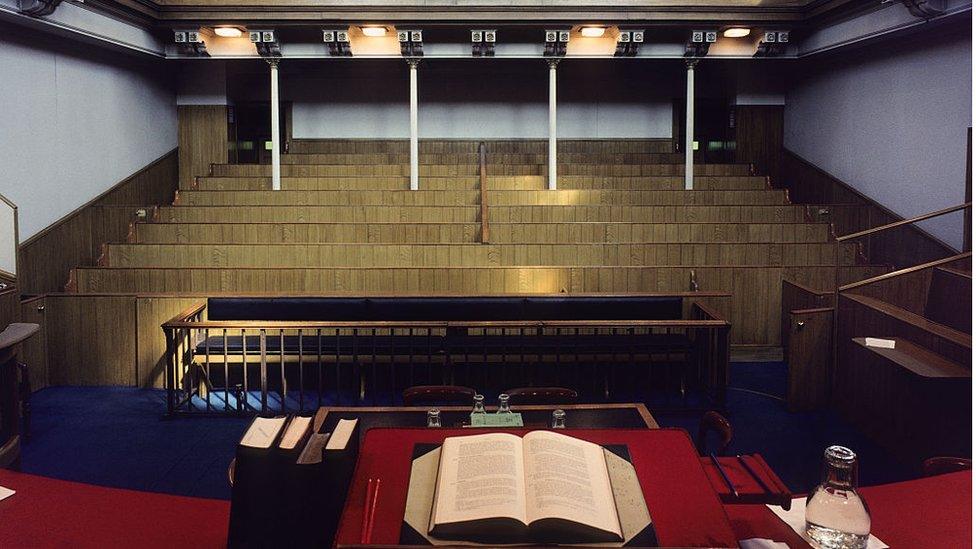
Serco's plans will be raised at the Court of Session in Edinburgh and at Glasgow Sheriff Court
Speaking on the BBC's Good Morning Scotland programme, Mr Soames said the legal challenges would be an opportunity for clarity on the law surrounding possible evictions.
He explained: "We recognise that there needs to be confidence among all parties that what we are doing is completely proper and legal.
"This problem of people not moving on when they have had negative decisions has been largely hidden from public view because in Scotland we've been paying for them to keep to their accommodation and stop them being homeless.
"We are now looking after 330 people at our own expense and it can't go on.
"We are not the judge of this. The Home Office is the judge of this and there has to be an end of the road."

The issue has led to days of demonstrations outside the Home Office in Glasgow
The Serco chief executive insisted the contractor would "not change the locks" on anyone unless the Home Office said they had reached the end of their appeal process.
"We are receiving about 180 new asylum seekers each week into Glasgow," he added.
"If the people at the end of the process don't move on, there is no housing in Glasgow for the vulnerable families and children who are at the beginning of the asylum seeker process, when they arrive.
"They are going to have to be put in hotels."
Mr Soames said providing housing for asylum seekers in Glasgow had cost Serco £80m more than it was being paid by the Home Office for the contract.
'We still provide accommodation'
A Home Office statement said asylum seekers "who would otherwise be destitute" are provided with free accommodation while their applications are considered.
It added: "While an asylum claim or an appeal is outstanding, we would not be seeking removal.
"If the courts have decided that someone has no right to remain in the United Kingdom it is right that they should leave the UK.
"However, if an asylum claim has failed, we will still provide accommodation for those who would otherwise be destitute and who are temporarily unable to leave the UK because of a practical or legal obstacle."
First Minister Nicola Sturgeon said the Scottish government "stand ready to offer any support that we reasonably can", calling for "more humanity at the heart of the immigration and asylum system".
- Published6 August 2018
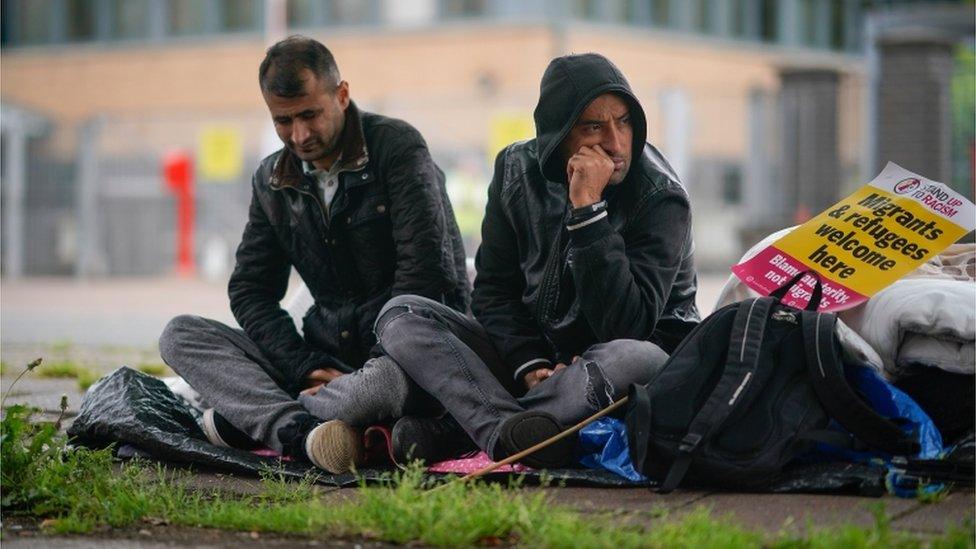
- Published3 August 2018

- Published1 August 2018
